|
I’m excited to welcome Cameron Macintosh to my blog today on his book blog tour for his new book series, Max Booth Future Sleuth. An introduction: Cameron Macintosh was born in Melbourne and has lived there ever since, apart from overseas backpacking jaunts whenever he’s been able to fund them. He studied Psychology and Italian at Melbourne University, and Professional Writing at RMIT. Worried that no one would ever publish any of his own books, he became an editor so that he could interfere with the books of others. Then, in 2008, a lovely publisher asked him to write a book about the Beaconsfield mine disaster. This was an excellent introduction to professional writing. Since then, he has written more than 80 books for primary and early secondary students. He has also honed hundreds of books for teachers and students in his other life as an editor for high quality educational publishers. In the few minutes per week that he isn’t wrestling with words on the laptop, he loves singing and playing the guitar, and reading music biographies. Cameron: Good morning Megan! Megan: How are you today? Are you ready to be interrogated...? I mean interviewed? Cameron: Thanks very much for making the time to chat - I hope I'll have a few brain cells working - anything could happen. Megan: Hehe. We shall soon see. It should certainly make things interesting. Let's begin. You have more than 80 titles in print throughout the world, which is incredible. I’m keen to hear what your journey into publication looks like. Cameron: Thanks Megan, it’s been a long journey and I definitely took the scenic route! Like most aspiring authors, I have a ream of rejection letters and emails to prove it. But I finally got a break into publishing by doing a work placement for an educational publisher – doing proofreading and photocopying (mostly photocopying, truth be told!) But… they were wonderful people and they eventually gave me a job as an editor, which I used to worm my way into authoring books for the educational market. And now the Max Booth books are my first foray into mainstream publishing, which is extremely exciting. Megan: Was this after you did the Creative Writing course at RMIT? Cameron: That's right - I actually did the work placement as a unit of the RMIT course. I'd really recommend aspiring authors and editors take any chance they can to do work placements. The personal contacts and experiences have made a huge difference. Although of course there are so many other interesting paths to publication - that one just happened to be a great springboard for me. Megan: That must have been an amazing opportunity that has certainly lead to many open doors for you, and it must have given you a lot of insight into the publishing industry. I read that one of your first books was to cover the Beaconsfield Mine disaster. How did you go about researching and writing it? Cameron: That was a really interesting and challenging first commission. The publisher wanted as much of it as possible to be based on primary sources and media coverage from the time of the incident, which allowed me to weave in a lot of authentic detail. But I felt the need, very strongly, to tread very carefully, as so many lives were impacted by the disaster and are still living with its aftereffects today. Megan: That must have been difficult, and you achieved it. What are some of the lessons you learned while researching and writing that particular book that has helped you since? Cameron: In terms of the research, I definitely took away a strong message about the need to double- and triple-check sources when writing non-fiction! And to do my utmost to respect the people who are being written about. As far as writing goes, that was my first experience of writing to a strict brief - which is standard in educational publishing - and to leave any hints of ego on the doormat. The goal in that situation is to give the publisher what they need, and that usually means producing a manuscript that will sit neatly alongside other books in the same series. More broadly though, it was a very practical way to learn the value of drafting and redrafting. I still have the ream of paper I went through to get that manuscript in order! Megan: You really took many valuable lessons away from that experience. So, you got your publishing break writing for the education market. You have written a lot for them. What is it like? For instance, do you choose the subjects that you write about? Or do you get a brief? Cameron: I really enjoy the educational writing. It's very much brief-driven, but all of the publishers I've worked with have been fantastic in their willingness to allow as much creative input as possible. I've definitely noticed some big differences between fiction and non-fiction commissions. With fiction, usually I've been asked to come up with my own story idea, but one that works with a particular theme or area of study. The trickiest parameter to deal with is the levelling - trying to stick to word lists and sentence lengths without suffocating the story! Non-fiction tends to be more prescriptive - the publisher will usually have a very specific idea about what they need from the manuscript - often with a bookmap - and I'll mostly be fleshing it out and trying to find interesting details to add. Both present their challenges but it's a fantastic industry to be a part of. Megan: That is really fascinating. You have a book that came out in July this year, Max Booth Future Sleuth: Book 1 - Tape Escape. It’s been illustrated by Dave Atze and is published by Big Sky Publishing. Can you give me a little spiel has to what the story is about? Cameron: Certainly! The premise of the story is that it’s the year 2424, in a city called Bluggsville. Our hero Max is an 11 year-old street kid who sleeps in a packing case in the city museum’s storeroom. He survives by identifying ancient artefacts that the museum staff haven’t been able to identify themselves, and gets paid some pocket money for each artefact he identifies. The objects he identifies are from the 20th and 21st centuries – things that the reader would know about but that are now mysterious to people in the year 2424. In Tape Escape, Max is given a weird lump of plastic to identify – a cassette tape from the 1980s. He discovers that it contains lost recordings by a still-famous rockstar. The recordings are so valuable that when a dodgy musicologist finds out about them, Max’s discovery suddenly gets him into all sorts of trouble (DOT DOT DOT!) Megan: It certainly sounds exciting, Cameron. I love hearing the stories behind the stories. Where did the idea for this particular story come from? Cameron: Thanks Megan. Well the spark of the story definitely came from a visit to Pompeii and the amazing archaeological museum in Naples. Seeing so many everyday objects that had survived a catastrophic volcanic eruption and centuries of burial was a real mind-blower. Cups and spoons that probably would've been quite uninteresting to the people of Pompeii were completely spellbinding to me - and this made me wonder how people of future generations might look at items that we commonly use today. This thought seemed to offer a lot of potential for story ideas, and I was eventually able to tease the idea out into a solid concept about a future detective, Max, who investigates objects from today, or recent decades, and is completely fascinated by them - even things that might not seem so interesting to us in the here and now. It's great fun choosing the present-day objects, and I must say that the illustrator, Dave Atze, really understands and manages to amplify the wonder, and humour, of Max's discoveries. Megan: That is so cool. I love how you didn’t just think about it and dismiss it, but continued that train of thought until a story emerged. Did the experience of writing your own novel prove different from writing to a brief? If so, in what way? Cameron: Great question! It was definitely a very different experience to writing to a brief. Just being able to let the story take its own shape and length was quite liberating after having written for the same age group, with so many limitations. At the same time, I think subconsciously it probably benefited from all of that brief-driven writing too - I really wanted the Max stories to engage both enthusiastic and reluctant readers, so it was helpful having a few parameters at the back of my mind in terms of vocab and sentence length. I really hope they've helped make the stories as accessible to as many readers as possible. Megan: That is really wonderful. I have dyslexia and it is one of them, as you say, perimeters, in my mind as well as to make sure that my book is accessible to as many readers as possible. I could seriously go off tangent here and start an in-depth discussion about engaging reluctant readers, but maybe another time. Back to your Max Booth book. How was it working with the illustrator? Did you have much input into the whole process? Cameron: That would be a really enjoyable discussion to have. I'd love to see your book! It was a real treat to work with Dave Atze on the two titles we've produced so far. He's incredibly versatile and really brings out the humour and pathos in the stories. I included illustration ideas in the manuscript (way too many!) but was more than happy for Dave and the publishers to work out which ones were worth pursuing. I was lucky enough to see Dave's roughs and throw in a few comments, but he's such an intuitive artist who really 'gets' the characters, so I was happy to keep out of the way as much as possible and let him work his magic - which he did incredibly well. Megan: That would be great to have another conversation, Cameron. I’d love to have a chat about my book, and writing fun and engaging stories to encourage children to read. I’m a huge sci-fi fan so I couldn’t help noticing that a few of your books have the sci-fi theme. What draws you to writing Sci-fi? Cameron: It's funny because I haven't read a lot of sci-fi as an adult, but I find it a really rich source ideas for kids' books. I think that's because it offers limitless possibilities of setting, in terms of time and physical location, as well as imagined technologies that you can use to shape and colour your stories. And who doesn't enjoy a bit of speculation about how the world might look in the future, as scary as that can be? And you can also get away with much more craziness - story wise - than you can in a story that requires realism or strict historical accuracy. A lifelong fascination with robots has definitely been an influence too! Megan: That’s so true. I think that’s why I love sci-fi and fantasy. The pure escapism into other worlds; other realities. So, Cameron, what do you think makes a good story? Cameron: Boiling it down to the simplest level, I think it comes down to interesting character/s, dealing with an interesting, and seemingly insurmountable, problem. As a reader, I love seeing how characters react when thrown into the deep end, and learning from how they sink or swim! I don't mean to imply that a good story needs to deal with high drama - the problem at the heart of the story can just as easily be an internal, emotional conflict. It's all worth sharing with the world. Megan: Those are really great tips, Cameron. What advice do you have for emerging authors? As you worked as an editor, could you please tell us from an editor’s point of view, and then as an author. Cameron: Wow, really interesting question. As an editor, I'd advise aspiring authors to look very carefully at publishers' submission guidelines and make sure you tick all of their boxes, as most publishers who accept unsolicited submissions deal with a huge volume of manuscripts - make sure you give yours every chance of being read. I used to do a bit of 'slush pile' reading (as much as I hate that term!) and found that so many of the submissions didn't match what the publishers had requested. And obviously, take the time to polish your work as much as possible before you send it out. One of the best ways to do this is to join or start a writing group with people whose opinions you can trust. As an author, I wish there was a magic formula but really, it’s all about persistence and self-belief, and humility is a useful attribute too – because you’re going to need it! I’ve known so many brilliant writers who faced a few rejections and gave up. I can't state strongly enough the need to have some kind of supportive writing community around you, too. I've been in a small but wonderful writing group for more than five years and the mutual encouragement and kind criticism has helped each of us beyond calculation... Megan: Thank you so much for being so candid about the submission process. As an author, you certainly need to be persistent and not give up in the face of rejection. And finding a supportive writing community is super important. So, Cameron, what’s next for you? Cameron: Well, I'm currently drafting the third Max Booth adventure and enjoying that very very much. I've just started scribbling down the bones of a 'grown-up' book too. I'll find out find very soon if I'm grown-up enough to see it through! Megan: That’s brilliant, Cameron. I’m sure you’ll learn a lot about yourself in the process. Okay. I always do three fun facts. So, what are three fun facts about yourself? Cameron: 1. I love toy robots from the 1980s, especially Dingbots and Omnibots (definitely worth Googling!) 2. I spent so much time in my teens and early 20s listening to the Beatles that I still consider Beatle-ologist as a viable fall-back career. 3. I cook at least two curries a week but will never refuse an invitation to dinner at an Indian restaurant! Megan: Where can we find you? Cameron: You can find more about me and my books on my website: www.cameronmacintosh.com , and on Big Sky Publishing website, and on Facebook as Cameron Mactosh author. You can check out the book trailer for Max Booth Future Sleuth: Book 1 - Tape Escape on my YouTube Channel. Max Booth Future Sleuth - Selfie Search is also now available. Megan: Thanks for taking the time to chat today, Cameron. It's been wonderful. Cameron: Thank you so much Megan! It's been a real pleasure. Follow the Book Blog Tour: Boomerang Books: Interview with Cameron Macintosh. Max Booth Future Sleuth 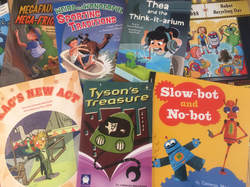 If you enjoyed this post feel free to like and share.
0 Comments
Your comment will be posted after it is approved.
Leave a Reply. |
AuthorOn my blog you will find: Categories
All
Click to set custom HTML
|
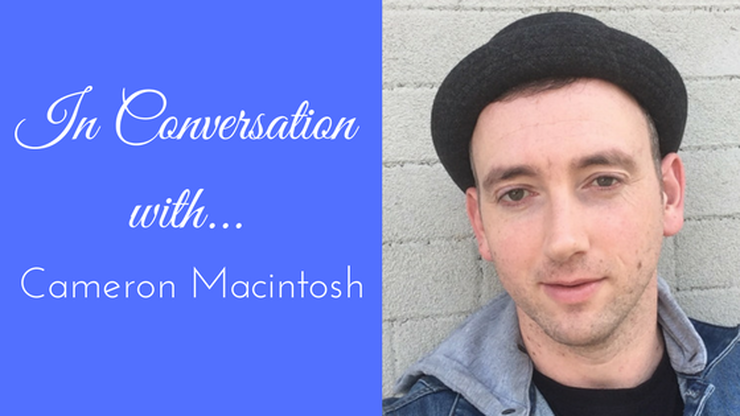

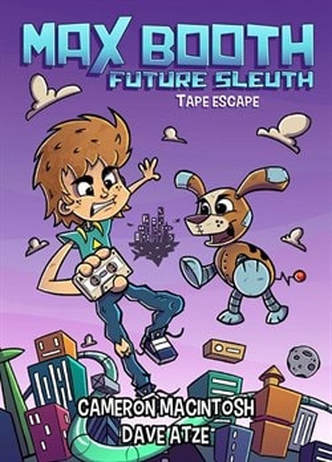
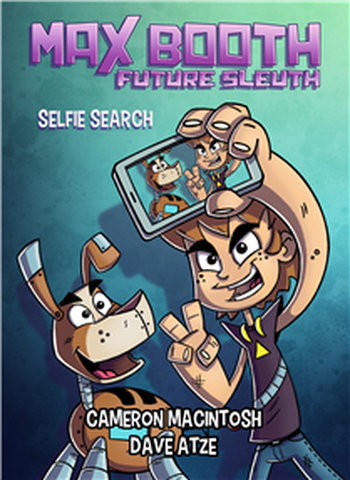
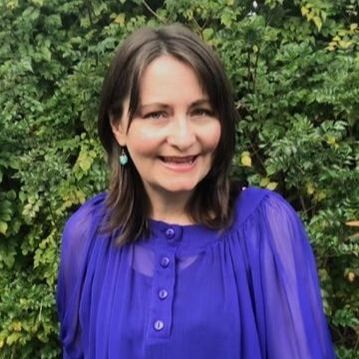
 RSS Feed
RSS Feed